|
|
|
Sort Order |
|
|
|
Items / Page
|
|
|
|
|
|
|
| Srl | Item |
| 1 |
ID:
120424
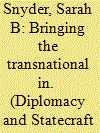

|
|
|
|
|
| Publication |
2013.
|
| Summary/Abstract |
One of the most interesting innovations in recent international history writing is the adoption of transnational approaches. This article echoes earlier calls for international historians to integrate transnational methods more fully into their work by highlighting the salience of human rights and influence of human rights activism as aspects that would otherwise be largely left out of the history of the Cold War. Such methodological innovation is essential to a deeper understanding of the Cold War.
|
|
|
|
|
|
|
|
|
|
|
|
|
|
|
|
| 2 |
ID:
120420
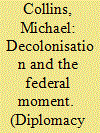

|
|
|
|
|
| Publication |
2013.
|
| Summary/Abstract |
Post-1945 decolonisation involved the universal acceptance of nation-statehood as the alternative to imperialism. Nationalism vanquished its transnational competitors, notably imperialism and Marxism. Alternatives to imperial rule that avoided sovereign states on national lines, such as federations in the later 1940s and 1950s, have received less attention from historians. Federations involved alternative ways of thinking about sovereignty, territoriality, and political economy. British interest in creating federations, for example the Central African Federation (CAF) in 1953, offers some new perspectives on the strength of imperial ideology and the determination to continue a missionary imperialism after the Second World War. Federal thinking and practice was prominent at this time in other European empires too, notably the French and Dutch ones. The federal idea was also an aspect of the emerging European community. This is suggestive of a wider "federal moment" that points to the importance of linking international, trans-national, imperial, and world historical approaches.
|
|
|
|
|
|
|
|
|
|
|
|
|
|
|
|
| 3 |
ID:
120421


|
|
|
|
|
| Publication |
2013.
|
| Summary/Abstract |
Duncan Sandys' tenure at the Ministry of Defence has usually been seen as one of the major turning points in post-war British defence policy. The consensus is that Sandys was a prime mover in bringing about a contraction of Britain's military capabilities in an era when economic constraints, coupled with the need for Britain to play a full part in maintaining the Western deterrent against Soviet expansion in Europe, dictated that Britain's ability to project military power beyond Europe had to shrink. Sandys' task was "radically pruning Britain's military capacity and adopting a defence posture more in keeping with a medium-size power." This shift in policy was brought about by the April 1957 Defence White Paper. It amounted to "the biggest change in military policy ever made in normal times." But emphasising that the Sandys White Paper was part of the wider process of decolonisation and nuclearisation overlooks the fact that in the seven years after it was published the British used conventional forces to mount no fewer than three expeditionary operations outside Europe.
|
|
|
|
|
|
|
|
|
|
|
|
|
|
|
|
| 4 |
ID:
120426
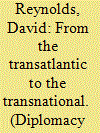

|
|
|
|
|
| Publication |
2013.
|
| Summary/Abstract |
The first of Kathleen Burk's many books, based on her Oxford D. Phil. dissertation, was Britain, America and the Sinews of War, 1914-1918 (1985). This explored a hitherto neglected aspect of the Great War when Britain became dependent on American supplies and finance to maintain its war effort. By the autumn of 1916 two million pounds of the five million needed every day by the British Treasury in order to prosecute the war came from the United States. "If things go on as at present," the Chancellor of the Exchequer warned, "I venture to say with certainty that by next June or earlier the President of the American Republic will be in a position, if he wishes, to dictate his own terms to us." The situation did improve somewhat after the United States entered the war in April 1917, but Britain's underlying dependence remained. The war had mobilised America as a global financial power, whilst also permanently sapping Britain's economic strength. In retrospect the period can be seen as a turning point in Anglo-American relations and, indeed, in global history.
|
|
|
|
|
|
|
|
|
|
|
|
|
|
|
|
| 5 |
ID:
120419


|
|
|
|
|
| Publication |
2013.
|
| Summary/Abstract |
Professor Kathleen Burk has worked on some of the key themes in the history of diplomacy for more than three decades. Foremost amongst them has been the role of financial strength in the projection of power, and other key themes have included the role of the individual in making state policy; the concept and practice of "imperialism"; and the importance of non-state actors, such as banks, businessmen, and even tourists in the interplay between nations. As this article demonstrates, she has attempted throughout to strike a historiographical balance, moved more by her empirical sense of the evidence than the fashions that have come and gone during her career. She worked on transatlantic relations before "Atlantic History" came to the fore; transnationalism before the movement of ideas across frontiers became an obsession; and imperialism before the recent recrudescence of interest in this arena too. In this special issue of Diplomacy and Statecraft, Professor Burk's former colleagues, collaborators, and pupils demonstrate how they have adopted and adapted her techniques: from the history of decolonisation to histories of charities to human rights, and covering topics as diverse as British defence policy and twentieth century Americans' concepts of what "Europe" is or might become.
|
|
|
|
|
|
|
|
|
|
|
|
|
|
|
|
| 6 |
ID:
120423
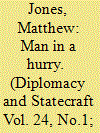

|
|
|
|
|
| Publication |
2013.
|
| Summary/Abstract |
The Year of Europe initiative, publicly launched by President Richard M. Nixon's Assistant for National Security Affairs, Henry Kissinger, with a speech delivered to an annual Associated Press gathering of prominent publishers, newspaper editors and media executives at the Waldorf-Astoria Hotel in New York City on 23 April 1973, is primarily remembered as a major policy failure that quickly unravelled amid acrimony and recrimination. 1 Despite its high-sounding aspirations, Kissinger's call for a new sense of purpose and revitalised set of objectives to animate the transatlantic alliance had the contrary effect of provoking European suspicions of American motives, and fears that the forging of a new "Atlantic Charter"-as Kissinger proposed in his speech-would become a device for Washington to reassert its hegemony over its alliance partners, just as there was a growing impetus behind closer moves toward Western European unity, with the European Community (EC) expanding its membership from six to nine at the start of the year, and beginning to search for a collective political voice.
|
|
|
|
|
|
|
|
|
|
|
|
|
|
|
|
| 7 |
ID:
120425
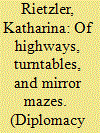

|
|
|
|
|
| Publication |
2013.
|
| Summary/Abstract |
This exploratory essay reflects on recent scholarship on twentieth-century European-American relations that has used the concept of "Americanisation," particularly with regard to cultural transfers. The essay analyses how concepts of Americanisation have changed over time and uses the historiography of American philanthropy abroad to illustrate these changes. Whilst most scholars who apply the concept now view Americanisation as a two-way process which entails selective adaptation and transformation, there are subtle differences in emphasis. The essay traces these in the use of metaphors. Two metaphors have achieved prominence recently, the highway and the turntable. Testing both against empirical material taken from the transnational history of American foundations, the article then introduces a third metaphor, the mirror maze, which brings out a neglected dimension, the question of reflexivity.
|
|
|
|
|
|
|
|
|
|
|
|
|
|
|
|
| 8 |
ID:
120422
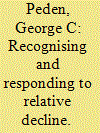

|
|
|
|
|
| Publication |
2013.
|
| Summary/Abstract |
It became increasingly apparent in the 1950s that Britain was in long-term relative economic decline. However, during far-reaching reviews in 1959-1963 of future policy, the Foreign Office and the Treasury could not agree that timely strategic retrenchment would be an appropriate response. Ministers believed that Britain would remain a world Power; the British economy continued to be handicapped by higher levels of defence expenditure than those of other western European Powers; and it took an economic crisis to force a decision to withdraw from east of Suez.
|
|
|
|
|
|
|
|
|
|
|
|
|
|
|
|
|
|
|
|
|